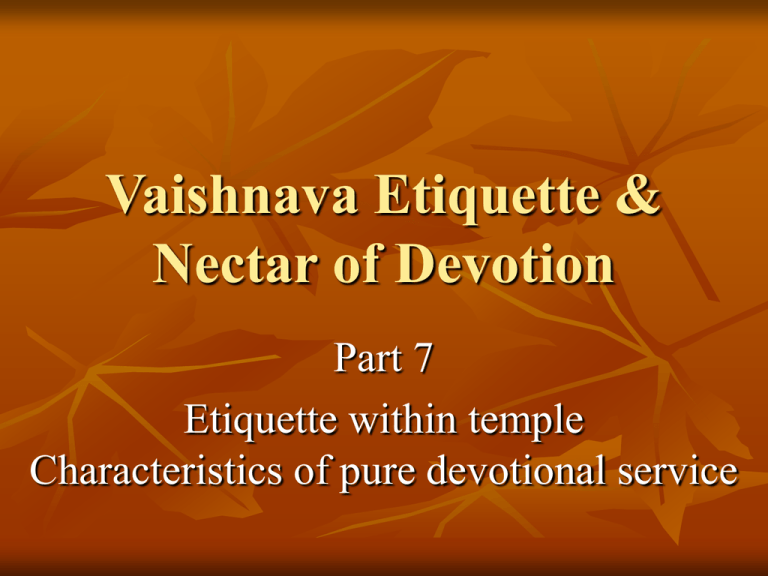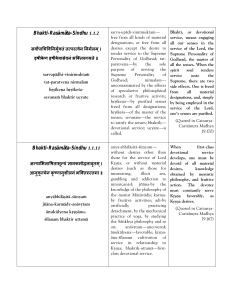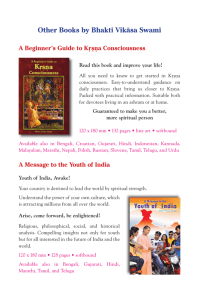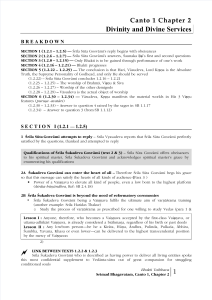
Vaishnava Etiquette &
Nectar of Devotion
Part 7
Etiquette within temple
Characteristics of pure devotional service
Mangalacharan verse 7-8
mädhuryojjvala-premäòhya-çré-rüpänuga-bhaktida
çré-gaura-karuëä-çakti-vigrahäya namo 'stu te
SYNONYMS
mädhurya—conjugal; ujjvala—brilliant; prema—love; äòhya enriched with; çré-rüpa-anuga—following Çréla Rüpa Gosvämé; bhakti-da—
delivering devotional service; çré-gaura—(of) Lord Caitanya Mahäprabhu; karuëä—(of) the mercy; çakti—energy; vigrahäya—unto
the personified; namaù—obeisances; astu—let there be; te—unto you.
TRANSLATION
I offer my respectful obeisances unto you, the personified energy of Çré Caitanya's mercy, who deliver devotional service which is
enriched with conjugal love of Rädhä and Kåñëa, coming exactly in the line of revelation of Çréla Rüpa Gosvämé.
namas te gaura-väëé-çré-mürtaye déna-täriëe
rüpänuga-viruddhäpasiddhänta-dhvänta-häriëe
SYNONYMS
namaù—obeisances; te—unto you; gaura-väëé—teachings of Lord Caitanya; çré-mürtaye—unto the personified; déna—(of) the fallen;
täriëe—unto the deliverer; rüpa-anuga—the philosophy which follows the teachings of Çréla Rüpa Gosvämé; viruddha—against;
apasiddhänta—(of) unauthorized statements; dhvänta—the darkness; häriëe—unto you who are removing.
TRANSLATION
I offer my respectful obeisances unto you, who are the personified teachings of Lord Caitanya. You are the deliverer of the fallen souls.
You do not tolerate any statement which is against the teachings of devotional service enunciated by Çréla Rüpa Gosvämé.
Etiquette within temple
Kanthi-Mala : Initiated devotees must wear 2-3
rounds Kanthi-Mala.
Aspiring devotee – following regulative principles
and chanting Hare Krishna can also wear KanthiMala.
Tulsi mala – symbol of surrender to Lord Krishna – if
not serious about it then it is offense.
Wearing other ornaments like – decorative Tulsi neck
mala, Jagannath rope, Pavitram etc. They should not
be worn in bathroom and only during some festival or
similar occasion.
Etiquette within temple
Kanthi-Mala protects from bad dreams,
accidents, attack by weapons and Yamadutas.
No Kanthi-Mala for those who don’t chant or
follow 4 regulative principles.
Even no Onion or Garlic consumed once
wearing Tulsi mala.
Moustache & beard : No moustache & beard in
ISKCON Vaishnava society.
Nectar of Devotion – Ch.1
Characteristics of devotional service are described by
Rüpa Gosvämé with evidences from different scriptures.
(1) Pure devotional service brings immediate relief
from all kinds of material distress.
(2) Pure devotional service is the beginning of all
auspiciousness.
(3) Pure devotional service automatically puts one
in transcendental pleasure.
(4) Pure devotional service is rarely achieved.
(5) Those in pure devotional service deride even the
conception of liberation.
(6) Pure devotional service is the only means to
attract Kåñëa.
Conclusion (2)
One who is not in Kåñëa consciousness usually cannot sit silently even for half an
hour.
They may sit down for so-called meditation, but immediately after their yogic
performance they will engage themselves again in such activities as illicit sex life,
gambling, meat-eating and many other nonsensical things.
But a Kåñëa conscious person - because he is engaged in Kåñëa consciousness he
automatically gives up all this nonsense and develops a high character.
One develops the highest character by becoming a pure devotee of Kåñëa.
The conclusion is that no one can truly have any good qualities if he is lacking Kåñëa
consciousness.
Happiness in Kåñëa Consciousness
Çréla Rüpa Gosvämé has analyzed the different sources of
happiness :(1) happiness derived from material enjoyment,
(2) happiness derived by identifying oneself with the
Supreme Brahman and
(3) happiness derived from Kåñëa consciousness.
In tantra-çästra Lord Çiva speaks to his wife - "My dear
wife, a person who has surrendered himself at the
lotus feet of Govinda and who has thus developed
pure Kåñëa consciousness can be very easily awarded
all the perfections desired by the impersonalists; and
beyond this, he can enjoy the happiness achieved by
the pure devotees."
Eternal Happiness
Happiness derived from pure devotional
service is the highest, because it is eternal.
The happiness derived from material
perfection or understanding oneself to be
Brahman is inferior because it is temporary.
There is no preventing one's falling down from
material happiness, and there is even every
chance of falling down from the spiritual
happiness derived out of identifying oneself
with the impersonal Brahman.












